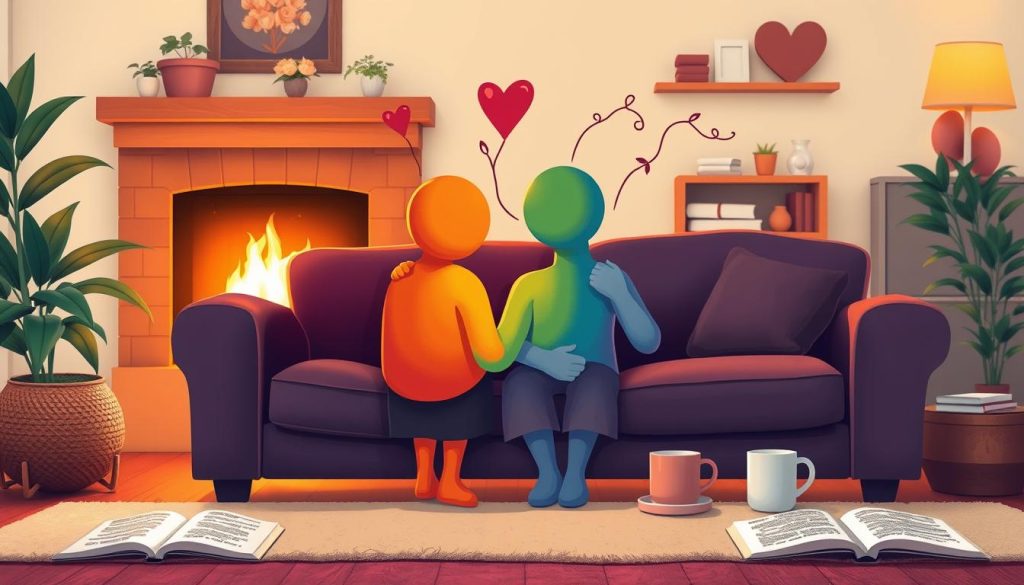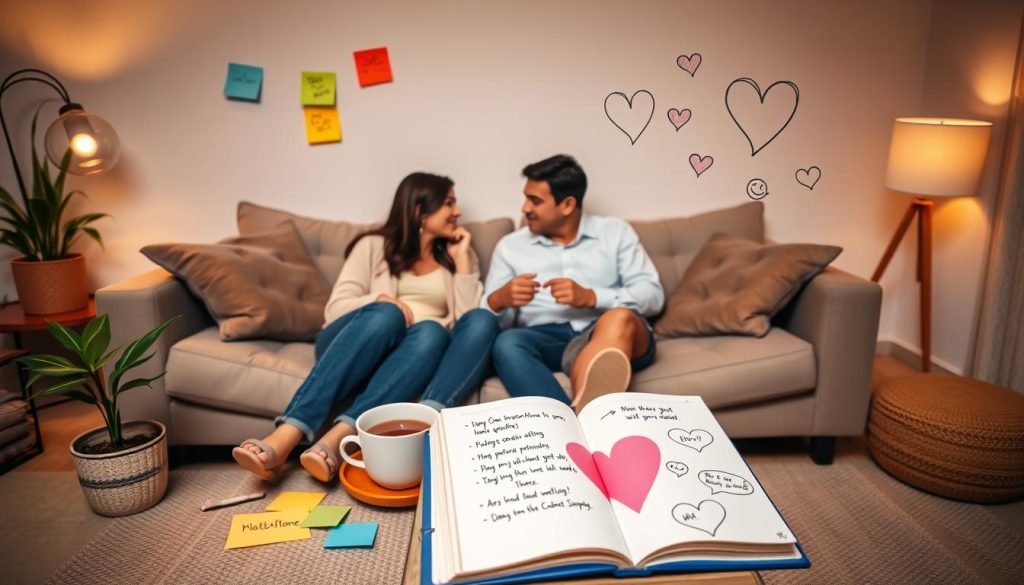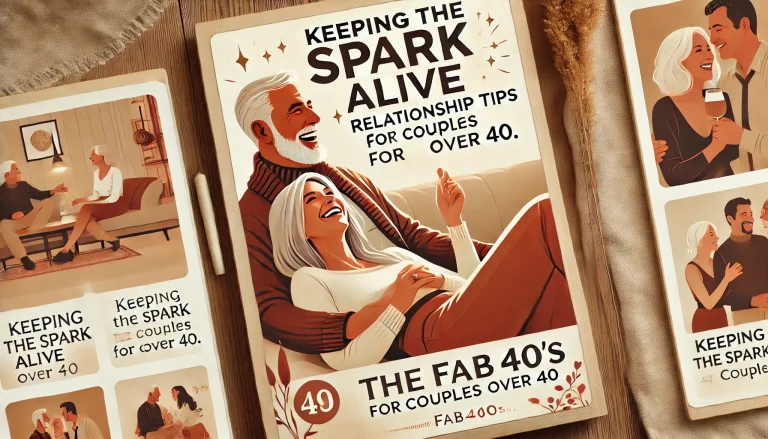Boost Daily Communication with Your Partner
Good communication is key to a healthy relationship. It builds trust and emotional closeness. By improving how you talk to your partner every day, you can strengthen your bond. Studies show that couples who talk regularly are happier and more likely to stay together.
Think about this: couples who stayed together for six years looked at each other 86 percent of the time when talking. This is compared to 33 percent for those who split up. These numbers highlight the role of daily talks in keeping relationships strong.
In this article, we’ll cover how to improve your communication with your partner. We’ll talk about spotting bad communication habits and creating daily rituals to deepen your connection. Our goal is to help you build a loving and lasting partnership.
Understanding the Importance of Daily Communication
Daily communication is key to a strong bond with my partner. Regular talks keep us connected and help solve problems. It builds understanding and love, making us feel supported.
Short, loving chats are a big part of our daily routine. Compliments and small gestures make our relationship happy. Talking about the good times in our week strengthens our bond.
Setting aside time for deep talks is important. We pick a day and time for these talks. It helps us stay committed to talking more.
Dealing with conflicts quickly stops resentment. I ask my partner how I can show more love. Open questions lead to deep conversations, helping us understand each other better.

Identifying Poor Communication Patterns
Understanding how we communicate in relationships is key to feeling closer. When we don’t talk well, misunderstandings and lost trust can happen. It’s important to spot these issues to strengthen our bonds.
Signs of Passive-Aggressive Behavior
Passive-aggressive behavior is a way to show anger without saying it. Look out for these signs:
- Using sarcasm instead of honest feedback
- Giving backhanded compliments
- Implementing the silent treatment during disagreements
These actions can hurt trust and make us feel alone. Fixing these issues early can help our conversations stay healthy.
Consequences of Brushing Issues Under the Rug
It might seem easier to ignore problems. But ignoring them can lead to big consequences of ignoring conflicts. Here’s what might happen:
- Development of larger issues that complicate future conversations
- Feelings of isolation as issues remain unresolved
- Increased likelihood of toxic communication patterns forming
Talking about problems as they come up can really help. Preparing for conversations can make them more positive and strengthen our connection.

How to Communicate Better with Your Partner Every Day
It’s key to have daily talks to keep a relationship strong. Talking about more than just daily stuff is important. Setting aside time to share feelings and dreams strengthens your bond.
For example, asking “How are we doing?” can lead to deeper talks. It helps you connect on a deeper level.
Daily Dialogue: Creating Intentional Communication
Working on communication can change your relationship for the better. It’s about making sure both partners feel heard. This makes your bond stronger and helps solve problems.
Some tips for better communication include:
- Make time for talks without distractions.
- Ask open-ended questions to share more.
- Pay attention to body language and facial expressions.
Effective Communication Skills for Couples
To talk better with your partner, focus on key skills. Active listening is one. It makes sure both feel heard and understood.
Using “I” statements helps share feelings without blaming. Regular practice of these skills deepens your emotional connection.

Being open and honest in talks helps couples face challenges together. Studies show most couples see big improvements by doing this. Daily talks that are open and caring lead to closer and more intimate relationships.
Recognizing the Role of Emotional Intelligence
Emotional intelligence is key in relationships. It helps us communicate better and build strong bonds. By understanding and managing our emotions, we can have deeper talks and face problems together.
Couples with high emotional intelligence talk better. They show empathy, self-awareness, and listen well. This makes both feel important and valued. It also helps solve conflicts smoothly, making the relationship happier.
But, low emotional intelligence can block communication. Signs like not caring about others’ feelings or trouble controlling emotions can cause problems. Spotting these signs is important for improving emotional health in a relationship.

Building emotional intelligence takes effort and practice. Mindfulness helps us connect with our feelings, leading to a better understanding of ourselves and our partners. Doing exercises that increase emotional awareness helps us grow individually and as a couple.
In short, emotional intelligence boosts communication and keeps relationships healthy and happy. Starting this journey together can lead to a fulfilling life as a couple.
Building Healthy Communication Habits
Healthy communication habits are key to strong relationships. Active listening in relationships makes our bond stronger and deeper. By giving my full attention, I show I care and ask questions to understand better.
This not only builds respect but also opens up our talks. Doing this makes our relationship more intimate and satisfying.
Practicing Active Listening Techniques
To be a good listener, I use a few key methods:
- Maintaining eye contact for meaningful connection.
- Repeating back my partner’s words to show understanding.
- Avoiding interruptions to ensure they feel heard.
These actions help build trust and show I’m really interested in what my partner says. Dr. John Gottman says listening well is key to a happy relationship.
Using “I” Statements for Expressing Feelings
Using “I” statements changes how we talk. Switching from “you” to “I” makes our talks less defensive and more helpful. For instance, saying “I feel hurt when…” instead of “You never…” helps my partner see my feelings without feeling blamed.
This way, we respect each other more and talk better. As we improve our effective communication skills, our relationship grows stronger. We create a safe place for honest talks, leading to understanding and empathy.

Strategies for Daily Communication
Daily communication is key to keeping relationships strong. Regular touchpoints help partners stay open and understanding. Mood check-ins and a daily dialogue exercise are great ways to improve communication.
Regular Check-ins: Mood Temperature
Mood check-ins help us share our feelings regularly. They let us know how each other is doing. By talking about our day, we can share both good and bad moments.
This practice can make communication easier, even for long-term couples. It helps avoid issues that might otherwise go unspoken. In fact, 88% of couples find it helps them stay connected.
Five-Minute Daily Dialogue Exercise
A five-minute daily chat can make a big difference. Asking simple questions like “What was the best part of your day?” can deepen our connection. It helps us understand each other better and feel closer.
By focusing on the positive, we can improve our communication. This is especially true for couples who feel less intimate. In fact, 93% of them say it brings them closer together.

The Power of Timing in Communication
Timing is key in communication with our partners. Choosing the right moment can change everything. It’s best to talk when both feel relaxed and open.
Finding the Right Moment to Talk
Knowing when to talk is crucial. Talking when your partner is stressed can lead to problems. It’s better to wait for a calm moment.
Signaling your intent to talk beforehand helps. This makes the conversation smoother and more productive.
Avoiding Discussions During Stressful Times
It’s also important to avoid talking when stressed. High tension can cause misunderstandings and hurt communication. Experts like John Gottman say to watch for signs like a racing heart.
By paying attention to these signs, we can talk when we’re both calm. This leads to better conversations.
Improving Conflict Resolution Skills
Every relationship faces challenges, often showing up as common conflicts. Understanding the reasons behind these arguments can greatly improve our skills in resolving conflicts. Issues can include household chores or financial concerns. Recognizing these helps us have more thoughtful discussions, creating a better environment for talking things through.
Recognizing Common Arguments
Common conflicts often stem from miscommunication or unmet expectations. Spotting these recurring issues, like disagreements over chores or parenting, is key. Active listening is crucial; both sides need to feel heard and understood. Asking open-ended questions can lead to deeper conversations, revealing issues that might not be obvious.
Compromise: The Goal of Productive Discussions
Compromise is vital in any lasting relationship. It turns potential conflicts into chances for growth and connection. Each partner should aim to find common ground, using “we” instead of “you vs. me.” If misunderstandings happen, taking a break can prevent things from getting worse. This way, we can have more thoughtful talks later, building trust and strengthening our bonds.
Nonverbal Communication: What Your Body Says
Nonverbal communication is key in how I connect with others, especially in relationships. Facial expressions show emotions like happiness and sadness. They are a basic part of how we communicate without words.
Gestures are also important. A simple wave can mean different things in different cultures. Knowing these differences helps me get along better with people.
Eye contact is crucial too. It can show love, interest, or even anger. Keeping the right amount of eye contact makes conversations flow better. Touch, like a hug, can also show trust and warmth.
Physical space is also important. Each culture has its own idea of personal space. Being aware of these helps me build stronger connections. My voice tone and quality also add meaning to what I say.
Getting nonverbal communication helps my relationships a lot. It’s about 80% of what we communicate. By paying attention to my body language and others’, I can communicate more clearly.
Creating a Safe Space for Open Dialogue
Creating a safe space for talking is key in any relationship. It lets both partners feel safe and supported. This way, they can talk openly about their feelings and needs.
Removing the Fear of Judgment
To make a safe space for talking, we need to get rid of the fear of being judged. This fear can make people defensive, stopping them from sharing their real feelings. To build this safe space, I follow a few important steps:
- Active Listening: This means really listening and showing we get what the other is saying without interrupting.
- Empathy: Getting what my partner feels helps lower tension and makes them more open.
- Non-defensive Responses: Not getting defensive when talked to helps keep the conversation supportive.
- Validation: Showing that their feelings are real, even if we don’t agree, builds trust.
Open dialogue helps break down walls built by past experiences. Mistrust or guarded talk often comes from past hurts. By recognizing these patterns, we can change how we talk to each other. When we feel understood and valued, we can be more open and vulnerable.
Working Together to Enhance Communication
In relationships, communication challenges often pop up. They can lead to misunderstandings or fights. It’s key to know when things get too hard. Sometimes, getting professional help is the best move to solve these problems.
Seeking Professional Help When Needed
When communication issues don’t go away, thinking about couples therapy is wise. A therapist can teach you new ways to talk to each other. Therapy helps couples understand each other better, making your bond stronger.
- Therapists can spot bad communication habits.
- Learning about each other’s ways of talking can bring peace.
- Professional advice can improve emotional closeness and how to solve fights.
- Regular sessions help keep the conversation healthy.
Looking for help makes your relationship stronger. It creates a place where you can share openly. Remember, everyone struggles with talking at some point. Getting professional help can change how you connect, building trust and understanding.
Encouragement and Praise: Building Each Other Up
In relationships, encouragement and praise are key. When my partner does something great, I always say thank you. This makes our bond stronger and creates a caring space.
It shows that supporting each other emotionally is crucial. This support helps both partners grow and succeed together.
The Importance of Positive Reinforcement
Words of encouragement can really boost spirits and strengthen ties. Studies show that people feel comforted and motivated when they receive praise. Even small affirmations can help build a strong foundation of love and appreciation.
- Couples who praise each other see a 25% boost in happiness.
- More than 70% of people feel uplifted after a partner’s compliment.
- Positive talks can lower stress levels, especially in tough times.
- For 60% of couples, focusing on mutual encouragement deepens their bond.
Also, the right words at the right time are very powerful. It’s important to keep conversations positive. I try to make sure three out of four things I say are uplifting.
Establishing Boundaries for Better Understanding
In relationships, setting clear boundaries is key for respect and understanding. Without them, partners may not know each other’s limits. This can cause emotional exhaustion and unhappiness.
There are different types of boundaries, like physical, emotional, and time ones. Each is important for how we interact with our partner. For example, having personal time can make our relationship better and more fulfilling.
- Rigid boundaries can lead to emotional distance.
- Porous boundaries may cause oversharing and discomfort.
- Understanding the need for adjustment as circumstances and relationships evolve is essential.
Talking about effective communication boundaries helps us be more open. When we discuss these, it shows we value each other’s feelings. This way, we both feel understood and valued.
Getting help from professionals can also be very helpful. By thinking about our values and our partner’s needs, we can build a better relationship. Talking about boundaries early on makes our relationship stronger. It helps us support each other better.
Addressing Past Mistakes without Harping
In relationships, talking about past mistakes is key to understanding and closeness. When we disagree, it’s easy to bring up old issues. But, it’s better to focus on fixing problems than dwelling on past hurts.
Many men in my community have expressed feelings of frustration and exhaustion when their partners continually mention previous mishaps. It’s clear that addressing past mistakes is necessary, but it shouldn’t dominate every conversation.
People have different reasons for bringing up old conflicts. They might:
- Not want to be wrong
- Not forgive or have low emotional control
- Want to control the talk
- Change the subject from the real issue
- Seek forgiveness by comparing
- Want to punish the other person
- Try to rebuild trust
- Feel unheard or unsafe
- Need to meet an emotional need
Constantly talking about past issues can hurt feelings and lower trust. My spouse and I have faced the same problems over the years. Showing respect and positive regard has made our talks better and our understanding deeper.
Growing together means both partners must be ready to face and solve deep problems. Without tackling these issues, building a loving and connected relationship is hard. Letting go helps us create a space where we can grow and be happy together.
Daily Rituals for Connection
Adding daily connection rituals to a relationship can really help. Simple actions like morning check-ins or evening talks keep partners engaged. Studies show two minutes of real talk is more valuable than a week without focus.
Starting each day with a positive greeting sets a good mood. A hug or smile can strengthen your bond. Regular rituals help couples appreciate each other and avoid taking things for granted.
Using the intentional couple approach is insightful. It focuses on mindful actions and positive experiences. Daily dances or saying thanks before bed can spark romance and love.
But, marriage trends often show less romance and talk. Creating strong rituals can fight this. Experts say about six hours a week together, including goodbyes and reunions, boosts connection. Dr. John Gottman says rituals help couples share meaning, key for a lasting bond.
Utilizing Technology to Stay Connected
In today’s fast world, technology is key to keeping love alive, even when we’re busy or apart. Messaging apps and video calls let me share moments with my partner instantly. This way, we can talk and feel close, even when life gets in the way.
Quality talks are more important than how often we talk, say relationship experts. They show how tech can help us have deep conversations. This is especially true when life’s distractions try to pull us apart.
But, social media can also cause problems, like misunderstandings and jealousy, as seen in Lisa and Tom’s story. It’s important to set limits on social media to keep our relationship strong. Too much screen time can also ruin special moments we share.
Still, I think technology can bring us closer when used right. Things like virtual dates or apps like “Couple” and “Between” help us bond. Sharing thoughts through texts or emails has made our emotional connection stronger. It shows that using tech wisely can make our relationships better than we thought possible.



